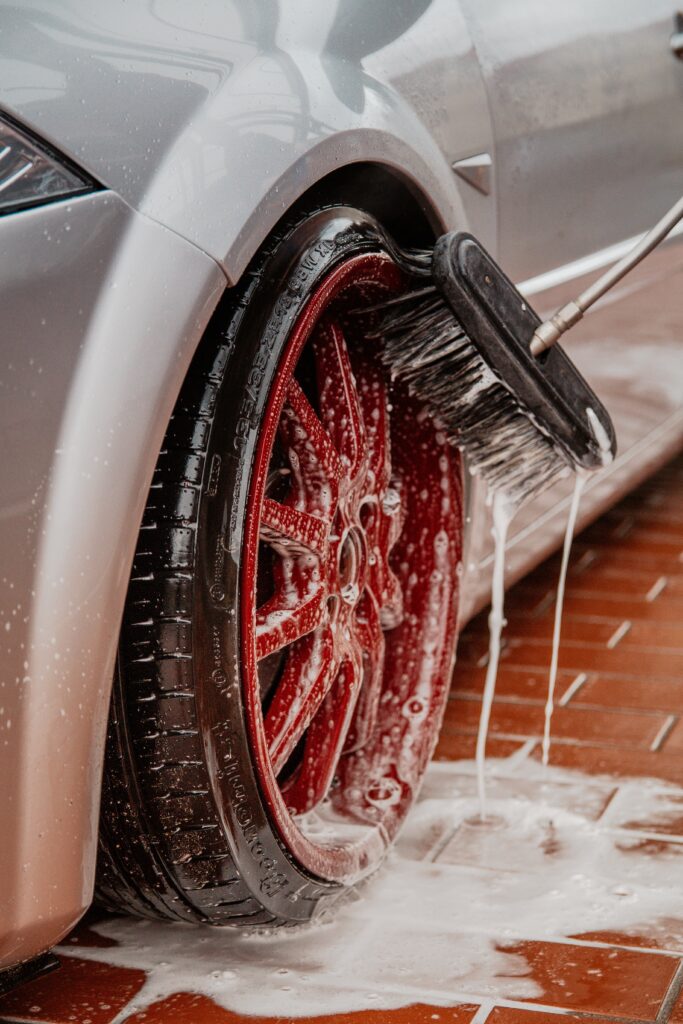(photo by https://findbyplate.com)
Car Wash Encyclopedia Entry
Note: I had written this film review for an encyclopedia and then the project itself got canceled. So, I decided to upload it to my site.
Car Wash is a 1976 Universal Studios film produced by Art Linson and Gary Stromberg, directed by Michael Schultz, and written by Joel Schumacher. This 97-minute musical comedy contains elements of drama and romance with at least one reviewer calling it reminiscent of 1930s theater. This blaxploitation film, set in the Dee-Luxe Car Wash located in Los Angeles, California, covers just one day of interactions among two dozen-plus multi-racial characters, including car wash staff, their customers, people working at nearby businesses, and more. Throughout the movie, employees listen to disco music from KGYS, dancing as they work with news breaks synchronizing with car wash events in this episodic-style film.
Film Characters
Dee-Luxe Car Wash is owned by the often-frazzled Leon “Mr. B” Barrow (Sully Boyar) who worries that competitors will put his car wash–one where men hand wash, sweep, and polish cars–out of business. He brings his college-educated son Irwin (Richard Brestoff) to the car wash to see if he can help with financial reporting. Instead, Irwin reads out loud from Quotations from Chairman Mao and espouses left-wing politics while wearing a Mao T-shirt. He wants to wash cars and otherwise unite with the “brothers” although he also takes the time to smoke pot in the restroom.
Car washing employees include an ex-con named Lonnie (Ivan Dixon) who has ideas to improve business operations, a flamboyantly gay character named Lindy (Antonio Fargas), and a black activist, Duane (Bill Duke) who prefers to be called Abdullah. The secretary, Marsha (Melanie Mayron), polishes her nails, loses a contact in her cold cream, and is in a relationship with the married Mr. B. T.C. “The Fly” (Franklin Ajaye) spends his spare time calling KGYS, trying to win tickets to a disco event to impress a local waitress, Mona, who isn’t acting interested in him.
Early in the film, a cab driver (George Carlin) is stuck in traffic in front of the car wash with Marleen (Lauren Jones), a prostitute who’d gotten her heart broken after falling in love with a customer. Carlin provides rambling philosophies about life, reassuring the black prostitute that he “ain’t got nothing against you people” and sharing that he supports the “lunch counter thing.” Marleen slips out of the car, stiffing him his fare, and then changes her clothes and wig in the car wash bathroom so she won’t be recognized as he searches for her.
Car wash customers include a slick-tongued preacher named “Daddy” Rich (Richard Pryor) who drives a gold limousine with a license plate T-I-T-H-E, something he’d like everyone to do at his Church of Divine Economic Spirituality. Backed up the Wilson Sisters (played by The Pointer Sisters), he provides a bit of tongue-in-cheek evangelizing while the sisters sing and a hat gets passed to collect an impromptu offering.
Another customer, reluctant to do business outside of Beverly Hills, drives in her Mercedes as her young son throws up out his window. She decides not to give the car wash employee the five-cent tip she’d planned because of her frustration over her sick son. As she drives away, the boy gets sick all over her and the car’s interior.
Yet another customer, “Professor” Irwin Corey, has a foil-covered pop bottle in a bag he’s carrying, causing some employees to believe he’s the Mad Bomber being discussed on KGYS. After employees chase him down, the bottle flies into the air but, rather than being blown up by a bomb, they discover this bottle contained the Professor’s urine sample for his doctor.
Comments About Society
Woven throughout the film are references to issues of the day. Examples include when a DJ on KGYS reports how a senior politician in Washington DC wants homosexuals to stay in their place; when car wash employees interact with Mr. B’s son Irwin as he tries to rally them with quotations from Mao Tse-Tung; through Duane’s comments about society; and when the employees need to deal with a snarling dog in a car they’re washing. This last example may not (hopefully!) be as obvious in today’s times, but it was a reference to a practice of some white people in that era to train dogs to protect themselves against black people. And, as Daddy Rich is getting his shoes shined and encouraging people to give him their money, he is sitting in front of pictures of Martin Luther King, Jr. and John F. Kennedy.
By the film’s end, some storylines appear to be resolving and characters growing while other characters, such as Marleen, continue in a dead-end lifestyle.
Resources
Canby, Vincent. “’Car Wash’ Froths on Screen with Pop Life.” The New York Times, The New York Times, 16 Oct. 1976.
“Car Wash.” YouTube, YouTube, 14 Nov. 2013.
Ebert, Roger. “Car Wash Movie Review & Film Summary (1976) | Roger Ebert.” RogerEbert.com, Roger Ebert, 1 Jan. 1976.
